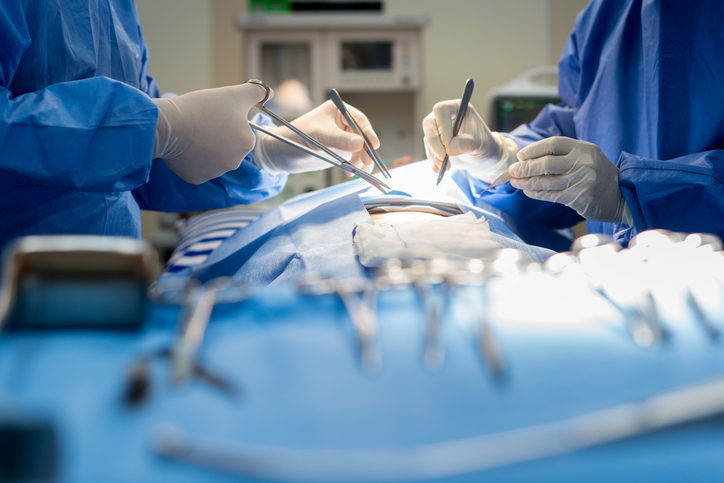Tuesday, 07 April 2020
Physiology experts are urging people on surgical waiting lists to consider using high-intensity interval training (HIIT) to boost the fitness of their heart and lungs during the COVID-19 pandemic.
The team of scientists at the University of Nottingham say their new research proves the benefit of HIIT in patients having surgery for urological cancer – results that are also relevant to everyone trying to avoid or recover from COVID-19.
In a paper published in a Nature journal, the researchers show how a group of older pre-surgical patients significantly benefitted from a cycling-based HIIT exercise programme in the month running up to their operations. The results suggest that this HIIT regime has the potential to reduce the chances of complications or death during and after surgery.
 Dr James Blackwell, Royal Derby Hospital and University of Nottingham
Dr James Blackwell, Royal Derby Hospital and University of Nottingham
Dr James Blackwell from the Royal Derby Hospital and the University’s School of Medicine said: “We set out to find out what effect a simple programme of HIIT had on patients waiting for surgery for prostate, kidney and bladder cancer and were pleased to see clear positive changes with this very specific type of supervised exercise. HIIT significantly improved cardio-respiratory function in our intervention group of patients, but larger trials are needed to see what difference it makes on post-operative complications, socio-economic impact and long-term survival. The COVID-19 pandemic may result in patients waiting longer for scheduled operations, it is essential that fitness levels do not drop during this time. There may be opportunity for patients to improve baseline fitness levels prior to surgery."
 Associate Professor Beth Phillips, University of Nottingham
Associate Professor Beth Phillips, University of Nottingham
Dr Bethan Phillips also from the University’s School of Medicine said: “We think the results of our trial have implications for the wider community in the light of the COVID-19 pandemic. We would advise everyone to try and increase their fitness by using simple programmes of HIIT which are freely available online, many of which can be done in the home or garden without special equipment. It’s so important that people stay fit as it improves their chances of fighting off COVID-19 or limiting the effects of the infection. This includes eating a healthy diet and cutting back on alcohol and smoking.”
In the HIIT randomised controlled trial for pre-operative patients, 40 people were recruited with an average age of 72. All patients were awaiting major urological surgery for cancer – operations which have relatively high rates of peri- and post-operative complications. The patients were randomised into either the control group for standard care, or a 4-week fully supervised HIIT intervention in the run-up to their operations. Measurements of cardio-respiratory fitness and muscle mass were taken before the first HIIT session and again a few days before surgery. The HIIT exercise consisted of a warm up on a static exercise bike then 5 x 1-minute bursts of cycling at the patient’s highest level of effort, followed by 90 second recovery periods of unloaded cycling and a two minute warm down.

There was a statistically significant reduction in the HIIT group’s resting blood pressure and also an increase in both the submaximal (anaerobic threshold) and maximum rate of oxygen they used (aerobic capacity) after the month-long period of the exercise trial. The researchers say these effects can have real benefits in helping patients who undergo surgery with fitter patients suffering fewer post-operative complications and recovering more quickly afterwards.
The study also shows that it is possible to make a meaningful difference in the fitness of patients in a relatively short space of time before their operations. Most urological surgery is carried out within 31 days of a decision to operate. Previously urology surgical patients have been given pelvic floor exercises to help avoid incontinence after operations but the HIIT intervention has the capacity to improve a wider range of aspects of fitness.
Story credits
For more information please contact Associate Professor Beth Phillips from the School Medicine at the University of Nottingham, email beth.phillips@nottingham.ac.uk or Emma Rayner, Media Relations Manager for the Faculty of Arts on +44 (0)115 951 5793 emma.rayner@nottingham.ac.uk
Notes to editors:
About the University of Nottingham
Ranked 97 in the world and 17th in the UK by the QS World University Rankings, the University of Nottingham is a founding member of Russell Group of research-intensive universities. Studying at the University of Nottingham is a life-changing experience, and we pride ourselves on unlocking the potential of our students. We have a pioneering spirit, expressed in the vision of our founder Sir Jesse Boot, which has seen us lead the way in establishing campuses in China and Malaysia - part of a globally connected network of education, research and industrial engagement.
Nottingham was crowned Sports University of the Year by The Times and Sunday Times Good University Guide 2024 – the third time it has been given the honour since 2018 – and by the Daily Mail University Guide 2024.
The university is among the best universities in the UK for the strength of our research, positioned seventh for research power in the UK according to REF 2021. The birthplace of discoveries such as MRI and ibuprofen, our innovations transform lives and tackle global problems such as sustainable food supplies, ending modern slavery, developing greener transport, and reducing reliance on fossil fuels.
The university is a major employer and industry partner - locally and globally - and our graduates are the third most targeted by the UK's top employers, according to The Graduate Market in 2024 report by High Fliers Research.
We lead the Universities for Nottingham initiative, in partnership with Nottingham Trent University, a pioneering collaboration between the city’s two world-class institutions to improve levels of prosperity, opportunity, sustainability, health and wellbeing for residents in the city and region we are proud to call home.
More news…